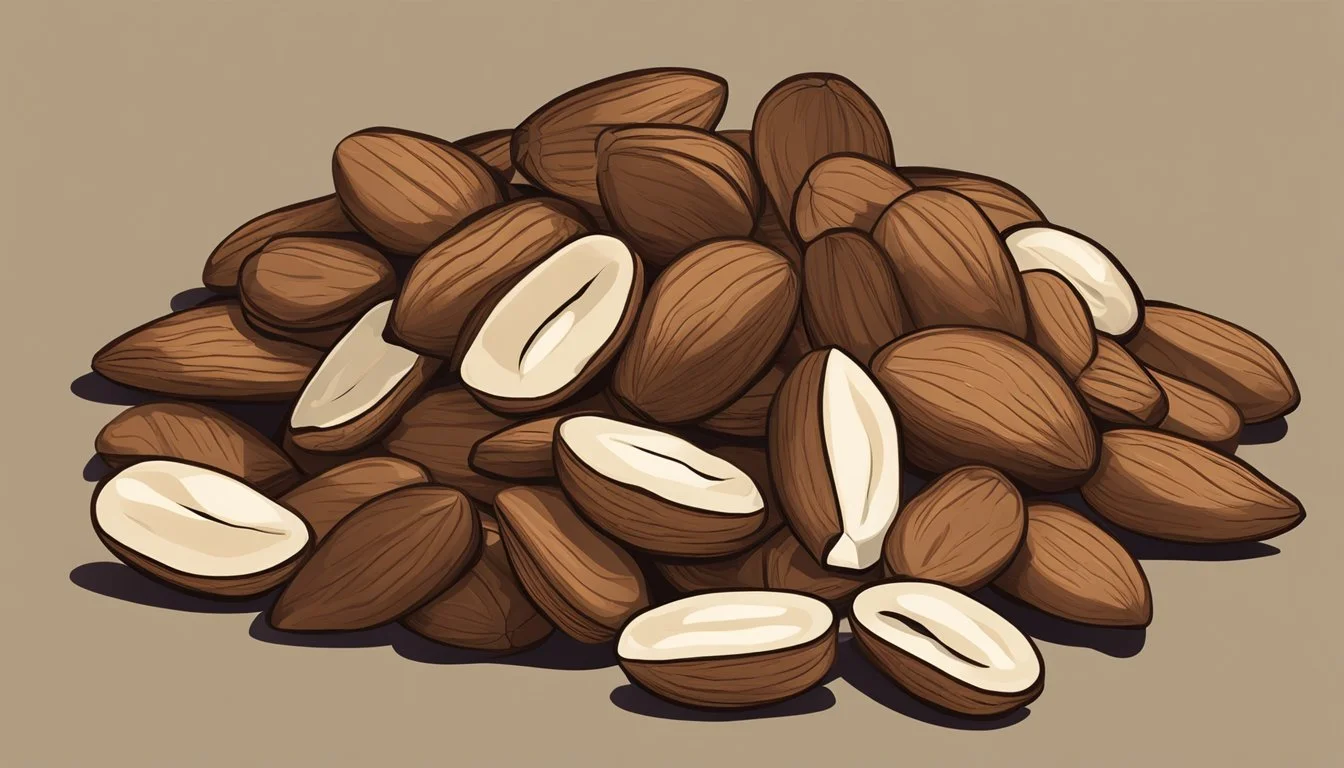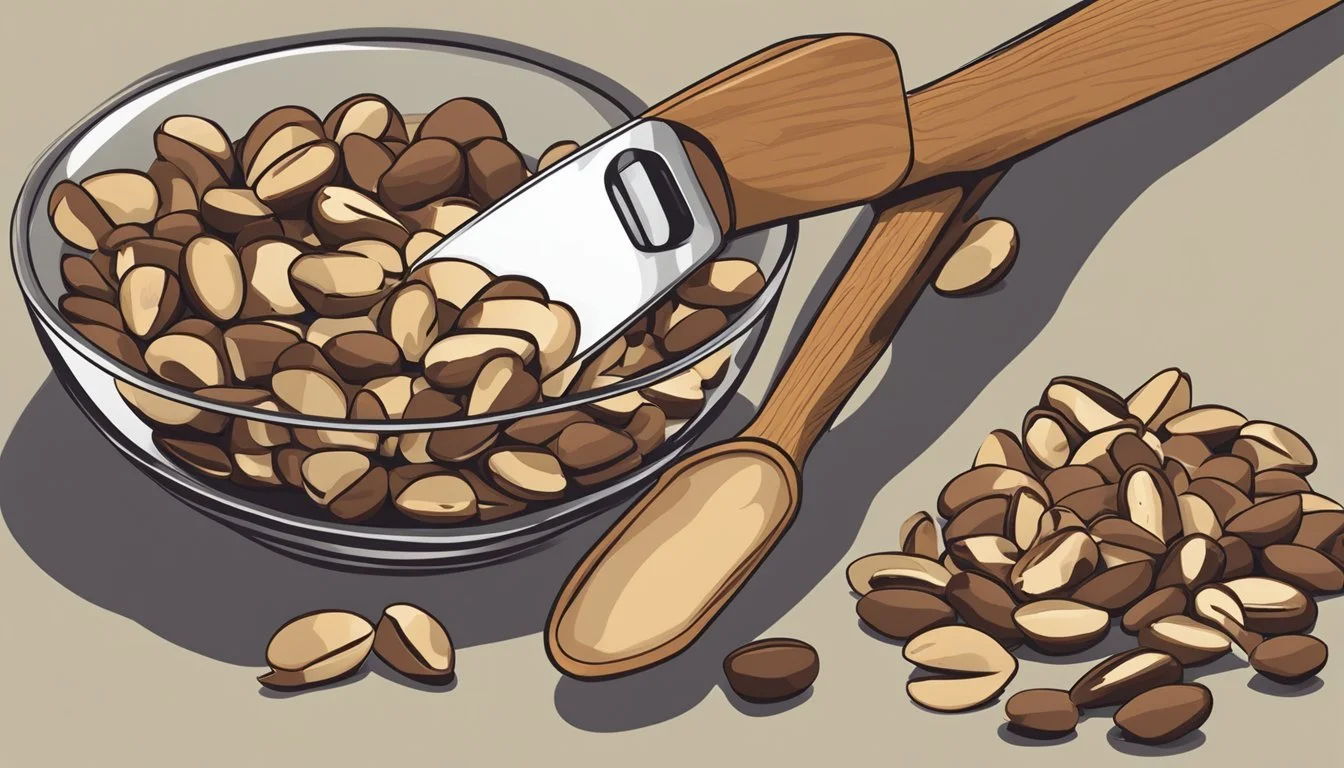How Many Brazil Nuts Should You Eat for Selenium
Optimal Daily Intake Unveiled
Brazil nuts are a potent source of selenium, a mineral essential for various bodily functions, including supporting immune system health and thyroid function. Selenium concentration is particularly high in the thyroid gland, underscoring the mineral's role in thyroid health. It is important to manage the intake of selenium through diet, as both deficiency and excess can have health implications.
Eating Brazil nuts (What wine goes well with nuts?) is a simple way to meet selenium requirements; however, due to their high selenium content, moderation is key. Nutritional experts suggest that consuming one to two Brazil nuts per day is typically sufficient to provide the body with its recommended daily intake of selenium. Although small quantities are beneficial, exceeding recommended amounts could lead to selenium toxicity, which underscores the importance of consuming these nuts in moderation.
Finding the balance in Brazil nut consumption may offer health benefits beyond selenium intake. They contain other valuable nutrients that contribute to overall health. While guidelines generally agree on the suggested serving size to be around one to two nuts per day, individual dietary needs may vary, and it's advisable for individuals to consult with a healthcare provider before making significant changes to their diet or using Brazil nuts as a selenium supplement.
Selenium Essentials
Selenium, a trace mineral, plays a pivotal role in maintaining various bodily functions, particularly through its involvement in antioxidant activity and thyroid function. It is crucial that adults consume the recommended amount to support overall health.
Role of Selenium in the Body
Selenium is integral to the synthesis of selenoproteins, which serve various functions, including acting as antioxidants. These proteins aid in protecting cells from oxidative damage. Selenium's most critical role is in the thyroid gland, where it helps regulate the production of thyroid hormone, thus influencing thyroid function.
Recommended Selenium Intake
The recommended dietary allowance (RDA) of selenium for adults is 55 micrograms per day. However, an upper limit of 400 micrograms daily has been established to prevent toxicity. These recommendations ensure that the body's needs for this essential nutrient are met without exceeding safe consumption levels.
Selenium Sources
Brazil nuts are a highly concentrated source of selenium. On average, a single Brazil nut provides about 68 to 91 micrograms of selenium:
Recommended serving: 1-2 Brazil nuts per day
Approximate selenium content per nut: 68-91 micrograms
Other dietary sources include:
Fish
Meat
Eggs
Dairy products
By including selenium-rich foods like Brazil nuts in their diet, individuals can meet their required intake without the need for additional supplements.
Health Benefits of Brazil Nuts
Brazil nuts are dense in nutrients and renowned for offering diverse health benefits, especially due to their high selenium content, which impacts thyroid function, antioxidant activity, heart health, and inflammation.
Boosting Thyroid Health
Brazil nuts are a rich source of selenium, an essential mineral for thyroid gland function, that aids in the production of thyroid hormones. These hormones are critical for metabolic regulation, and maintaining an adequate selenium intake can help ensure thyroid health.
Antioxidant Properties
The high selenium content in Brazil nuts plays a significant role as an antioxidant. This helps in protecting the body's cells from damage caused by free radicals, ultimately may help reduce the risk of chronic diseases.
Heart Health and Cholesterol
Thanks to their levels of polyunsaturated fatty acids (PUFAs), Brazil nuts have a positive effect on heart health. PUFAs are known to support healthy cholesterol levels, which is critical for reducing the risk of heart disease.
Polyunsaturated fats: Help lower bad cholesterol (LDL) levels
Magnesium and copper: Also found in Brazil nuts, contribute to heart health
Anti-inflammatory Effects
Brazil nuts contain compounds that exhibit anti-inflammatory effects. Chronic inflammation is associated with various diseases; thus, the inclusion of anti-inflammatory foods like Brazil nuts may support overall health and well-being.
Nutritional Profile of Brazil Nuts
Brazil nuts are renowned for their high selenium content and offer a rich spectrum of nutrients, essential for various bodily functions. They are a dense source of healthy fats and provide a substantial amount of minerals and vitamins in every serving.
Macro and Micronutrient Breakdown
Calories and Fats: Brazil nuts are calorie-dense and rich in fats, primarily consisting of unsaturated fats, which are considered healthy fats. A typical 1-ounce serving contains approximately:
Calories: 185
Total Fat: 18g
Saturated Fat: 4g
Unsaturated Fat: 14g (includes both monounsaturated and polyunsaturated fats)
Protein and Fiber: They also contribute a modest amount of protein and are a good fiber source:
Protein: 4g
Fiber: 2g
Minerals: A standout feature of Brazil nuts is their mineral content, especially:
Selenium: A single Brazil nut can contain 96 micrograms, which is significantly higher than many other nuts.
Magnesium: Provides about 27% of the Recommended Dietary Allowance (RDA) in a 4-6 nut serving.
Other minerals include calcium, copper, zinc, iron, potassium, and manganese.
Vitamins: Brazil nuts contain vitamins such as:
Vitamin E: Functions as an antioxidant.
B-vitamins: Including folate.
Comparative Nutritional Value
Selenium Content: Brazil nuts offer nearly 1,000% of the RDA of selenium in a 1-ounce serving, surpassing most other nuts and food sources in selenium content.
Healthy Fats: Compared to other nuts, Brazil nuts have a higher ratio of unsaturated to saturated fats, which is beneficial for heart health. The presence of polyunsaturated fatty acids (PUFA) like omega-6 and omega-3 fats is notable in supporting overall health.
Mineral Richness: In terms of mineral density, Brazil nuts provide more magnesium, copper, and manganese when compared to many other nuts. Iron and calcium are present in appreciable amounts that contribute to overall mineral intake.
In summary, Brazil nuts are a nutrient powerhouse, providing a rich array of healthy fats, essential minerals, and vitamins that can contribute positively to a balanced diet when consumed in moderation.
Potential Risks and Side Effects
While Brazil nuts are a potent source of selenium, excessive intake can lead to adverse health effects. This section unpacks the risks and side effects associated with overconsumption of Brazil nuts.
Selenium Toxicity
Brazil nuts contain high levels of selenium, a trace mineral essential for health in small amounts. However, they should be consumed cautiously, as too much selenium can result in selenosis, a condition marked by symptoms such as nausea, diarrhea, and hair loss. Chronic selenium toxicity may also lead to more severe issues like kidney failure. It's generally advised to eat no more than a few Brazil nuts per day to avoid surpassing the recommended dietary intake of selenium.
Allergies and Intolerances
Allergic reactions to Brazil nuts can occur in some individuals and may manifest as a typical skin rash, or in more severe cases, anaphylaxis. Those with known allergies to nuts should avoid Brazil nuts. Additionally, individuals with nut intolerances need to be aware that consuming Brazil nuts might lead to gastrointestinal discomfort including diarrhea and nausea.
Other Health Considerations
As with any high-calorie food, moderation is essential. Brazil nuts are caloric dense, and overindulgence might lead to weight gain. They should be consumed as part of a balanced diet. When considering their high selenium content, it's crucial for consumers to assess their total daily selenium intake from all sources to avoid potential side effects of excess consumption.
Brazil Nuts in the Diet
Brazil nuts are a nutrient-rich snack, offering a significant amount of selenium. They are versatile and can be consumed in various forms, including raw, roasted, or as a component in diverse recipes.
Consumption Methods and Recipes
Brazil nuts serve as an enriching addition to one’s diet and can be incorporated into meals in many ways. Consumed raw, they retain most of their nutritional value and can be enjoyed as a standalone snack or tossed into salads for added crunch. Due to their hearty, creamy texture, they're an excellent ingredient for homemade pesto, providing a more nuanced flavor profile compared to traditional pine nuts. For those looking to get creative in the kitchen, Brazil nuts can be chopped or blended to be used in a variety of recipes, from healthful smoothies to rich desserts.
Raw vs. Roasted Brazil Nuts
The choice between raw and roasted Brazil nuts is not just about taste preference but also impacts their nutritional profile. Raw Brazil nuts are believed to preserve the integrity of their vitamins and minerals. However, for consumers who favor a nuttier or more enhanced flavor, roasting them might be preferable.
Raw Brazil Nuts:
Retain their natural oils
Higher levels of nutrients preserved
Can be soaked to enhance digestibility
Offer a crunchier texture and richer taste
May be available salted or unsalted
Could have a slightly reduced nutrient content due to heating
Regardless of the preparation method, moderation is key, as Brazil nuts are high in calories. Maintaining balance and portion control is essential to harness their health benefits without excess calorie intake.
Factors Affecting Selenium Content
The selenium content of Brazil nuts can vary widely due to several contributing factors, particularly soil and environmental conditions. Understanding these factors is key to assessing the selenium one can expect to consume from these nuts.
Soil and Environmental Factors
Soil: The primary determinant of selenium content in Brazil nuts is the selenium concentration of the soil where the trees grow. Soils rich in selenium will typically yield Brazil nuts with higher selenium content.
Geographical variation: Regions with selenium-rich soils, such as certain areas in Brazil, often produce nuts with higher selenium levels. Conversely, soils deficient in selenium will result in nuts with lesser amounts.
Agricultural practices: Farming techniques that affect soil quality, including the use of fertilizers and crop rotation, can also influence the selenium content of the soil and, therefore, the nuts produced.
Environmental factors: Environmental conditions, including rainfall, evaporation, and pH levels of the soil, also play a significant role in the selenium levels of Brazil nuts.
Climate: Heavy rainfall can lead to leaching of selenium from soils, while drought conditions can concentrate selenium levels.
Soil pH: The acidity or alkalinity of the soil can affect selenium availability to the trees, with certain pH levels facilitating better uptake of selenium by the plant roots.
Given the variability influenced by these factors, the selenium content in Brazil nuts can range significantly, necessitating consideration when consuming them as a dietary supplement.
Research and Studies
Research on Brazil nuts has provided valuable insights regarding their role in selenium supplementation and overall health impact. Studies consistently show that Brazil nuts are a rich source of selenium, with variable amounts depending on the nut size and soil content.
Latest Findings
Recent randomized clinical trials have investigated the effects of Brazil nuts on selenium status and various health markers. The trials indicate that Brazil nuts, in amounts varying between 5 to 20 grams per day, can significantly increase selenium levels beyond the recommended daily intake of 50 micrograms, but still within the safe upper limit of 400 micrograms. These findings support the use of Brazil nuts as an effective means to improve selenium intake and suggest potential benefits for blood lipid profiles and markers of oxidative stress and inflammation.
Historical Overview
Historically, research on Brazil nuts has often focused on their use as a natural selenium supplement. Studies from the early 2000s estimated that two Brazil nuts could provide approximately 100 micrograms of selenium, which enhances their reputation as a potent source of this essential micronutrient. Over time, laboratory analyses, such as inductively coupled plasma mass spectrometry, have corroborated these estimates by precisely measuring the selenium content of Brazil nuts. This historical data laid the groundwork for current dietary recommendations regarding Brazil nut consumption for optimal selenium intake.





